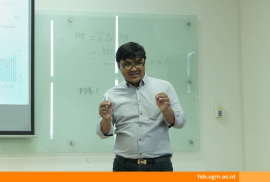On Tuesday (27/06), Prof. Dr. Supriyadi, M.Sc., C.A., Ak., officially confirmed as a professor in the field of Accounting at the Faculty of Economics and Business. This event was held offline at the UGM Senate Hall and broadcast live via the Gadjah Mada University YouTube channel. Prof. Supriyadi graduated from the FEB UGM Accounting study program in 1988. Subsequently, he earned a Master of Science (M.Sc.) degree in Accounting from California State University, Fresno, USA, in 1993 and earned a doctorate in accounting from the University of Kentucky, United States, in 1998. His inaugural speech at the inauguration ceremony was entitled “Challenges to Ethical Competence in Business in the Digital Age”.
Prof. Supriyadi explained that technology is developing rapidly and is currently unstoppable. The dramatic digitalization of business processes has opened up new opportunities for manufacturing and service companies also finance and accounting professionals. Meanwhile, the challenges posed are equally significant. According to Integrity Indonesia (2021), Kaspersky Lab’s research involving 26 countries worldwide indicates that business ethics violations in the digital industry continue to increase. Thus, the management of digital technology must be carried out in a socially, economically and environmentally responsible manner.
The impact of technological change has targeted various fields, including the accounting profession. Meanwhile, some experts say that accounting has a bleak future in the digital world. However, technological developments such as cloud-based data management, process automation, and advanced analytics can be prepared to increase the empowerment of the accountant’s role. Accountants can use their unique skills to turn insights based on AI data analysis results into more effective financial planning and reporting. “Thus, the expertise and duties of accountants in the digital business era will be greatly expanded but still refer to the core competencies of the accounting profession,” said Prof. Supriyadi.
The orientation of applying business ethics is the wider community (society) and stakeholders (stakeholders). However, the reality often is that management’s attention and concern are more focused on economic utilitarianism for a particular group of stakeholders, namely shareholders and management itself. This business practice is inconsistent with ethical principles and corporate social responsibility (CSR). Thus, ethical competence for players (investors, managers, accountants, innovators, and employees) in this digital era business is necessary. Ethical competence is not limited to understanding ethical principles but must also be equipped with responsibility and sustainability competencies
Reportase: Adella Wahyu Pradita




